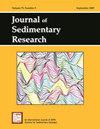Demarcation of Early Pennsylvanian paleovalleys in depozones of the Appalachian foreland-basin system based on detrital-zircon U-Pb and Hf analysis
IF 2.1
4区 地球科学
Q1 GEOLOGY
引用次数: 0
Abstract
Detrital-zircon (DZ) U-Pb data show that Appalachian-affiliated sediment was transported to western Laurentia by the Carboniferous, yet additional DZ U-Pb data from the eastern United States suggest that sediment-routing systems were oriented south toward the Ouachita deepwater sink. Within this context, this study presents DZ U-Pb ages from the Lower Pennsylvanian Caseyville Formation of Illinois, and U-Pb ages and εHf values from the coeval Pottsville Formation of Alabama as well as sandstone petrographic data from the Caseyville Formation, the Pottsville Formation, and the Jackfork Group of the Ouachita Basin to document provenance, delineate drainage divides in the Appalachian foreland-basin system, and comment on the unlikelihood of transcontinental sediment routing from the eastern United States to western United States at this time. Two DZ U-Pb age distributions from quartz arenite sandstones of the Caseyville Formation display prominent ca. 1250–950 Ma, 1550–1300 Ma, 1800–1600 Ma, and 3500–3000 Ma ages, consistent with ultimate derivation from Grenville, Midcontinent granite–rhyolite, Yavapai–Mazatzal, and Superior provinces, as well as minor contributions from ca. 500–400 Ma and 2000–1800 Ma grains. Two DZ U-Pb age distributions from sublitharenite sandstones of the Pottsville Formation display prominent ca. 500–400 Ma, 1250–950 Ma, 1550–1300 Ma, and 1800–1600 Ma ages, consistent with ultimate derivation from Appalachian, Grenville, Midcontinent granite–rhyolite, and Yavapai–Mazatzal provinces, as well as minor contributions from ca. 2000–1800 Ma and 3500–3000 Ma grains. The Pottsville Formation samples demonstrate a greater percentage of Appalachian and Grenville ages relative to the Caseyville Formation samples, whereas the Caseyville Formation samples have elevated Yavapai–Mazatzal and Superior percentages relative to the Pottsville. We interpret these differences to suggest parallel fluvial systems in the foredeep and back-bulge depozones of the Appalachian foreland-basin system. Like DZ studies of modern deep-sea fans that demonstrate an affinity to feeder fluvial systems, this study demonstrates fidelity between endmember segments of ancient fluvial-to-deepwater systems. Multidimensional scaling (MDS) analysis shows that DZ samples from the Pottsville and Caseyville formations cluster with deepwater Jackfork Group samples, and we infer a source-to-sink relationship from these two distinct source areas to the Ouachita terminal sink. One example of large-scale inclined strata thickness from the Caseyville Formation also suggests a drainage basin area of > 105 km2. Contextualized with these observations, we suggest that the foredeep and backbulge depozones of the Appalachian foreland-basin system steered distinct Early Pennsylvanian rivers across emergent continental shelves during periods of low sea-level, which discharged to distinct slope canyons and sourced > 100-km-long deep-sea fans. Clearly circumscribed, southward- or southwestward-oriented paleodrainage areas provide a template of the Appalachian foreland-basin system, and as such the central and southern Appalachians were an unlikely source for the Appalachian signature observed in the western United States at this time.基于碎屑锆石U-Pb和Hf分析的阿巴拉契亚前陆-盆地体系沉积带早宾夕法尼亚古山谷划分
碎屑锆石(DZ) U-Pb数据表明,阿巴拉契亚附近的沉积物在石炭纪被输送到劳伦西亚西部,而来自美国东部的额外DZ U-Pb数据表明,沉积物路线系统向南朝向Ouachita深水汇。在此背景下,本研究利用伊利诺斯州下宾夕法尼亚Caseyville组的DZ U-Pb年龄、阿拉巴马州同时期的Pottsville组的U-Pb年龄和δ hf值,以及瓦希托盆地Caseyville组、Pottsville组和Jackfork组的砂岩岩石学数据来证明物源,划定阿巴拉契亚前陆-盆地体系的水系划分。并对此时从美国东部到美国西部的横贯大陆沉积物不太可能进行评论。Caseyville组石英砂质砂岩的2个DZ U-Pb年龄分布突出显示约1250 ~ 950 Ma、1550 ~ 1300 Ma、1800 ~ 1600 Ma和3500 ~ 3000 Ma,与Grenville、Midcontinent花岗流纹岩、yavaphai - mazatzal和Superior省的最终来源一致,约500 ~ 400 Ma和2000 ~ 1800 Ma的颗粒贡献较小。Pottsville组次岩屑砂岩的两个DZ U-Pb年龄分布显示出突出的约500-400 Ma、1250-950 Ma、1550-1300 Ma和1800-1600 Ma,与Appalachian、Grenville、Midcontinent花岗流纹岩和yavaphai - mazatzal省的最终来源一致,以及约2000-1800 Ma和3500-3000 Ma颗粒的少量贡献。与Caseyville地层样品相比,Pottsville地层样品中Appalachian和Grenville年龄的比例更高,而Caseyville地层样品中Yavapai-Mazatzal和Superior年龄的比例高于Pottsville地层样品。我们将这些差异解释为在阿巴拉契亚前陆-盆地体系的前深沉积带和后隆起沉积带存在平行的河流系统。就像DZ对现代深海扇的研究表明了与支线河流系统的亲和力一样,这项研究表明了古代河流到深水系统的端段之间的保真度。多维尺度(MDS)分析表明,来自Pottsville和Caseyville地层的DZ样品与深水Jackfork组样品聚集在一起,我们从这两个不同的源区推断出源-汇关系到Ouachita终端汇。Caseyville组的一个大范围倾斜地层厚度的例子也表明,流域面积为100 - 105平方公里。结合这些观测结果,我们认为阿巴拉契亚前陆-盆地体系的前深沉积带和后隆起沉积带在低海平面时期引导了不同的宾夕法尼亚早期河流穿过突起的大陆架,这些河流流入不同的斜坡峡谷,形成了100公里长的深海扇。明确界定的南向或西南向古水系区域提供了阿巴拉契亚前陆-盆地体系的模板,因此,阿巴拉契亚中部和南部不太可能是当时在美国西部观察到的阿巴拉契亚特征的来源。
本文章由计算机程序翻译,如有差异,请以英文原文为准。
求助全文
约1分钟内获得全文
求助全文
来源期刊
CiteScore
3.80
自引率
5.00%
发文量
50
审稿时长
3 months
期刊介绍:
The journal is broad and international in scope and welcomes contributions that further the fundamental understanding of sedimentary processes, the origin of sedimentary deposits, the workings of sedimentary systems, and the records of earth history contained within sedimentary rocks.

 求助内容:
求助内容: 应助结果提醒方式:
应助结果提醒方式:


